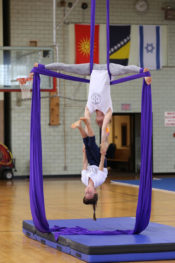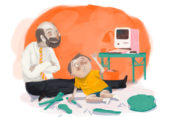 Space speaks. Its language is movement.
Space speaks. Its language is movement. Middle School Science With Roberto Trostli
Middle School Science With Roberto Trostli Resiliency and the Art of Education
Resiliency and the Art of Education Full-Time Teacher Education
Full-Time Teacher Education Roadmap to Literacy Books & Courses
Roadmap to Literacy Books & Courses Transforming Voices Worldwide
Transforming Voices Worldwide Apply Today: New Cohort Starts Nov. 2025
Apply Today: New Cohort Starts Nov. 2025 Bringing Love to Learning for a Lifetime
Bringing Love to Learning for a Lifetime The Journey is Everything
The Journey is Everything Waldorf Training in Australia
Waldorf Training in Australia Immersive Academics and Arts
Immersive Academics and Arts Quality Education in the Heartland
Quality Education in the Heartland Train to Teach in Seattle
Train to Teach in Seattle Jamie York Books, Resources, Workshops
Jamie York Books, Resources, Workshops Summer Programs - Culminating Class Trips
Summer Programs - Culminating Class Trips Caring for All Stages of Life
Caring for All Stages of Life ~ Ensoul Your World With Color ~
~ Ensoul Your World With Color ~ Waldorf EC Training & Intensives in Canada
Waldorf EC Training & Intensives in Canada Bay Area Teacher Training
Bay Area Teacher Training Flexible preparation for your new grade
Flexible preparation for your new grade
 Great books for Waldorf Teachers & Families
Great books for Waldorf Teachers & Families Everything a Teacher Needs
Everything a Teacher Needs Association for a Healing Education
Association for a Healing Education Waldorf-inspired Homeschool Curriculum
Waldorf-inspired Homeschool Curriculum
Would you like to become a sponsor?
Waldorf News

'Our house is on fire': Greta Thunberg, 16, urges leaders to act on climate: Swedish school strike activist demands economists tackle runaway global warming.
February 11, 2019
Our house is on fire. I am here to say, our house is on fire. According to the IPCC (Intergovernmental Panel on Climate Change), we are less than 12 years away from not being able to undo our mistakes. In that time, unprecedented changes in all aspects of society need to have taken place, including a reduction of our CO2 emissions by at least 50%. And please note that those numbers do not include the aspect of equity, which is absolutely necessary to make the Paris agreement work on a global scale. Nor does it include tipping points or feedback loops like the extremely powerful methane gas released from the thawing Arctic permafrost. More »

Play, Games, and Sports in Childhood – The Right Thing at the Right Time
January 28, 2019
As parents and educators our challenge is to help our children develop into healthy, happy, free adult human beings. To do that, we have to realize that a child is not a miniature adult, but a unique, developing being who has to go through a process of becoming a mature human being. The infant, the young child and even the adolescent are to some degree “outside” themselves. They are in a process of incarnation, of bringing into their growing and changing physical bodies other dimensions of their being—energetic, emotional, intellectual, and spiritual. Rudolf Treichler, a psychiatrist who was a student of Rudolf Steiner, held that parents can help children by bringing them IN in such a way that they can go OUT again freely, IN enough so that the children are really present in their bodies (fully incarnated), and OUT in such a way that they can come back in. This rhythmical breathing of OUT and IN is necessary in becoming a mature, free adult. If children are not brought in to their bodies in a timely way, they may ‘hover’ on the periphery of life—seeming dreamy, perhaps lazy, or even disengaged. On the other hand, if the outside world drives them in too much, they can get stuck, and then they can’t get back OUT in a healthy way. They may then seek inappropriate ways to get out, such as alcohol and drug abuse. More »

I’m a Developer. I Won’t Teach My Kids to Code, and Neither Should You
January 20, 2019
On a recent late-night formula run, I passed by a large display of books about teaching children to code. I have seen these books around, but never such a large display directed toward elementary-aged children. These books are part of a flood of resources—summer coding camps, after-school code clubs, apps designed to teach kindergarteners the rudiments of JavaScript—aimed at equipping children with future-proof skills. It’s easy to see why parents push coding on their children. What better way to prepare our kids for a future ruled by software than by training them how to build it? If everything is going to be automated, it’s much safer to be the one doing the automating. And if learning to code is good, then learning earlier is better. But while these products may teach kids specific coding languages, they actually have very little to do with the work of creating software. A former co-worker of mine was trained at a coding boot camp with the motto “Coding Is the New Literacy.” That sentiment is at the heart of all the programming books and games. The description in one popular book says starting coding early is “essential to prepare kids for the future.” This gives the impression that not teaching kids to code is somehow equivalent to not teaching them to read. That is, of course, ridiculous. Coding is not the new literacy. While most parents are literate and know to read to their kids, most are not programmers and have no idea what kind of skills a programmer needs. Coding books for kids present coding as a set of problems with “correct” solutions. And if your children can just master the syntax, they’ll be able to make things quickly and easily. But that is not the way programming works. Programming is messy. Programming is a mix of creativity and determination. Being a developer is about more than syntax, and certain skills can only be taught to the very young. More »

Using Colored Light Elixirs with Children
January 14, 2019
The best known vibrational waters are flower essences, first developed by Dr. Edward Bach in the 1920’s in England. A simulated dew process, they are made by placing flower blossoms in a bowl of spring water exposed to early morning sunlight. Dr. Bach’s original repertory of 38 flower essences address core emotions in need of harmonizing: denial, anxiety, depression, anger and fear. Working with clients over the years as a flower essence practitioner, I found a need to develop three kinds of essences to address the three-fold body, soul and spirit: flower essences, which harmonize soul forces or your thoughts and feelings; gem elixirs to align your newly harmonized feelings with the physical body via the various crystalline forms in gemstones, and a new kind of essence: colors in water that infuse the various subtle layers of your system with pure colors, enhancing your spirit. The Waldorf schools, initiated by the Austrian philosopher Rudolf Steiner, use color on the walls of their classrooms as a way of cocooning children and teens in environments that reflect their stage of conscious: peach blossom pinks for kindergarten children, red for 1st grade and on through the rainbow of colors until high school when the rooms become shades of higher consciousness: lilacs, magentas, purples. I developed a series of twelve colors in water after nine years of asking: ‘’What is a natural way of delivering color to the body, beyond the use of electric light?” The liquid colors work directly on people, animals and environments. Sprayed around gardens and home exteriors, landscapes reveal renewed life force, drawing in birds and animals. Called ‘Colored Light Elixirs’, they are proving the be helpful with children and teens, as well as adults. The Flora Corona Colored Light Elixirs are colors projected into water using sunlight. Calibrated 30 degrees apart, it is the specific tone of each color that makes them work accurately with the human energy system. More »

"Learn to Change the World: Encounter, Engagement, Inclusion" - New Waldorf Centennial Film
December 10, 2018
Paul Zehrer produced and directed this new film and it's fantastic. You'll see and hear students and teachers from Waldorf schools around the world talking about today's children, the challenges and rewards of education, and how we encounter each other, engage, and include each other in relationships and in community. It's truly wonderful. You'll love watching it. More »
 Recent Jobs
Recent Jobs
View more jobs »
 Newsletter Archive
Newsletter Archive
 Join the Mailing List!
Join the Mailing List!
Stay Connected…
Each week receive the Waldorf News Weekly Update, full of news, events, and more. Keep abreast of what's happening with Waldorf education.
 RSS Feeds
RSS Feeds